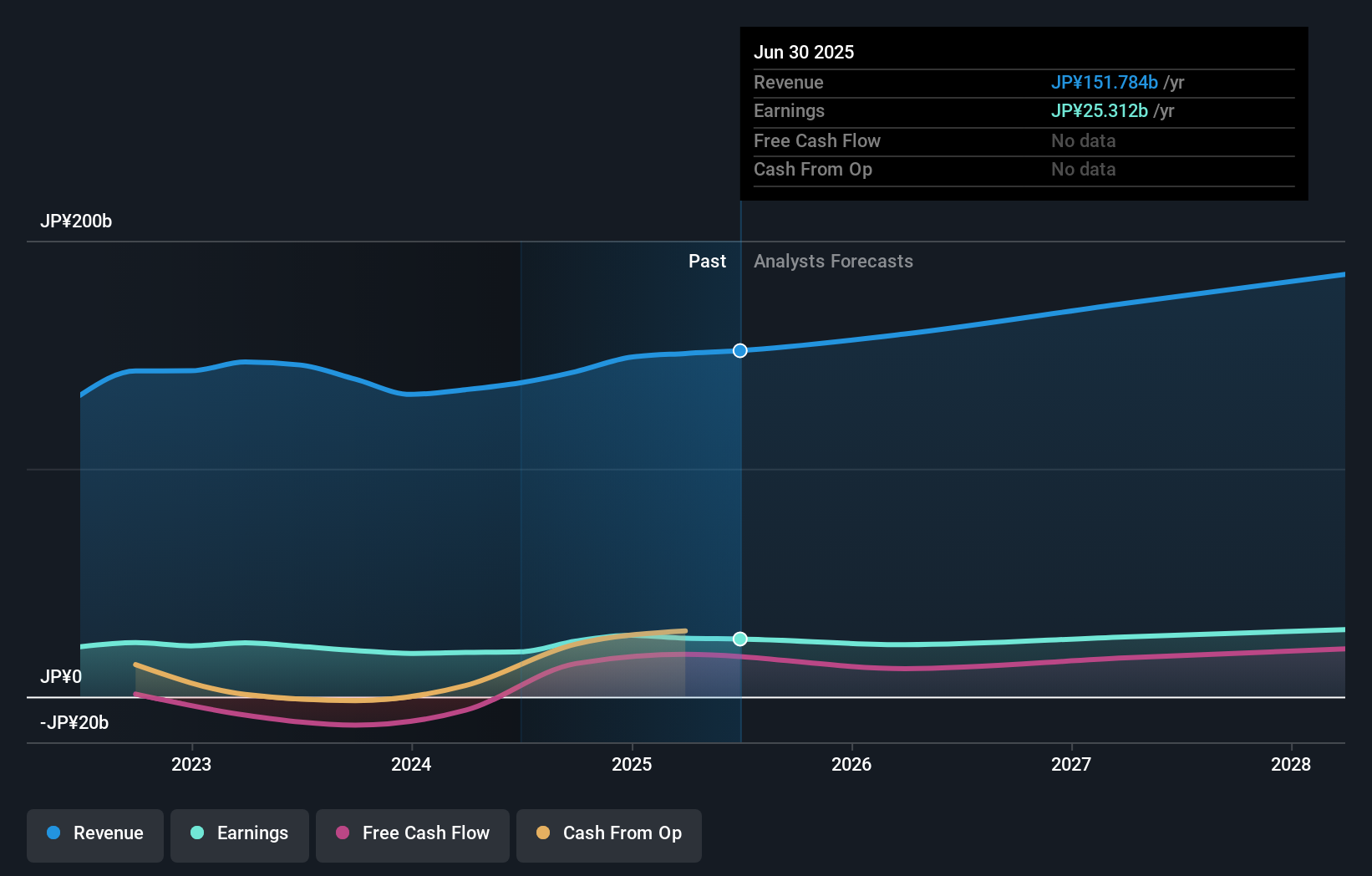- Japan
- /
- Semiconductors
- /
- TSE:7729
Institutional owners may ignore Tokyo Seimitsu Co., Ltd.'s (TSE:7729) recent JP¥17b market cap decline as longer-term profits stay in the green
Key Insights
- Institutions' substantial holdings in Tokyo Seimitsu implies that they have significant influence over the company's share price
- The top 17 shareholders own 50% of the company
- Ownership research along with analyst forecasts data help provide a good understanding of opportunities in a stock
To get a sense of who is truly in control of Tokyo Seimitsu Co., Ltd. (TSE:7729), it is important to understand the ownership structure of the business. We can see that institutions own the lion's share in the company with 55% ownership. Put another way, the group faces the maximum upside potential (or downside risk).
Losing money on investments is something no shareholder enjoys, least of all institutional investors who saw their holdings value drop by 4.9% last week. However, the 12% one-year return to shareholders might have softened the blow. They should, however, be mindful of further losses in the future.
In the chart below, we zoom in on the different ownership groups of Tokyo Seimitsu.
Check out our latest analysis for Tokyo Seimitsu

What Does The Institutional Ownership Tell Us About Tokyo Seimitsu?
Institutional investors commonly compare their own returns to the returns of a commonly followed index. So they generally do consider buying larger companies that are included in the relevant benchmark index.
As you can see, institutional investors have a fair amount of stake in Tokyo Seimitsu. This implies the analysts working for those institutions have looked at the stock and they like it. But just like anyone else, they could be wrong. It is not uncommon to see a big share price drop if two large institutional investors try to sell out of a stock at the same time. So it is worth checking the past earnings trajectory of Tokyo Seimitsu, (below). Of course, keep in mind that there are other factors to consider, too.

Since institutional investors own more than half the issued stock, the board will likely have to pay attention to their preferences. Tokyo Seimitsu is not owned by hedge funds. Looking at our data, we can see that the largest shareholder is Nomura Asset Management Co., Ltd. with 11% of shares outstanding. With 8.5% and 5.2% of the shares outstanding respectively, Asset Management One Co., Ltd. and Capital Research and Management Company are the second and third largest shareholders.
Looking at the shareholder registry, we can see that 50% of the ownership is controlled by the top 17 shareholders, meaning that no single shareholder has a majority interest in the ownership.
Researching institutional ownership is a good way to gauge and filter a stock's expected performance. The same can be achieved by studying analyst sentiments. There are plenty of analysts covering the stock, so it might be worth seeing what they are forecasting, too.
Insider Ownership Of Tokyo Seimitsu
The definition of an insider can differ slightly between different countries, but members of the board of directors always count. Management ultimately answers to the board. However, it is not uncommon for managers to be executive board members, especially if they are a founder or the CEO.
Most consider insider ownership a positive because it can indicate the board is well aligned with other shareholders. However, on some occasions too much power is concentrated within this group.
We can report that insiders do own shares in Tokyo Seimitsu Co., Ltd.. This is a big company, so it is good to see this level of alignment. Insiders own JP¥5.2b worth of shares (at current prices). It is good to see this level of investment by insiders. You can check here to see if those insiders have been buying recently.
General Public Ownership
With a 43% ownership, the general public, mostly comprising of individual investors, have some degree of sway over Tokyo Seimitsu. This size of ownership, while considerable, may not be enough to change company policy if the decision is not in sync with other large shareholders.
Next Steps:
It's always worth thinking about the different groups who own shares in a company. But to understand Tokyo Seimitsu better, we need to consider many other factors. For example, we've discovered 1 warning sign for Tokyo Seimitsu that you should be aware of before investing here.
If you are like me, you may want to think about whether this company will grow or shrink. Luckily, you can check this free report showing analyst forecasts for its future.
NB: Figures in this article are calculated using data from the last twelve months, which refer to the 12-month period ending on the last date of the month the financial statement is dated. This may not be consistent with full year annual report figures.
Valuation is complex, but we're here to simplify it.
Discover if Tokyo Seimitsu might be undervalued or overvalued with our detailed analysis, featuring fair value estimates, potential risks, dividends, insider trades, and its financial condition.
Access Free AnalysisHave feedback on this article? Concerned about the content? Get in touch with us directly. Alternatively, email editorial-team (at) simplywallst.com.
This article by Simply Wall St is general in nature. We provide commentary based on historical data and analyst forecasts only using an unbiased methodology and our articles are not intended to be financial advice. It does not constitute a recommendation to buy or sell any stock, and does not take account of your objectives, or your financial situation. We aim to bring you long-term focused analysis driven by fundamental data. Note that our analysis may not factor in the latest price-sensitive company announcements or qualitative material. Simply Wall St has no position in any stocks mentioned.
About TSE:7729
Tokyo Seimitsu
Manufactures and sells semiconductor production equipment (SPE) and measuring instruments in Japan.
Undervalued with solid track record and pays a dividend.
Similar Companies
Market Insights
Community Narratives






